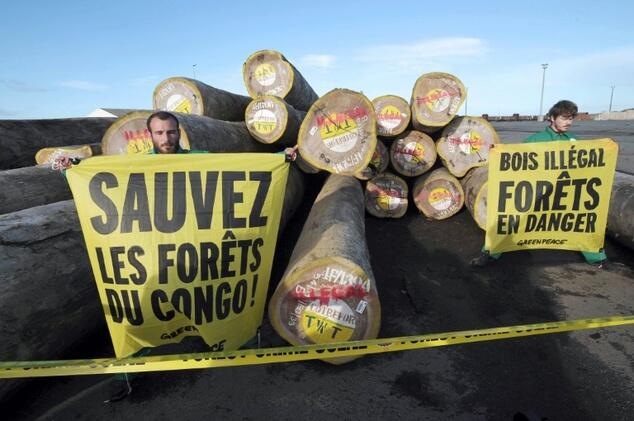The Democratic Republic of Congo said Thursday it was expelling two investigators from the British environmental watchdog Global Witness, accusing the pair of fomenting revolt against the logging industry.
“The government of the Republic has tasked me with declaring (them) undesirable… and to ask them to leave the country by tonight,” Environment Minister Robert Bopolo told a press conference, where he showed the two to the media.
Global Witness has gained a widening reputation for detailed investigations, sometimes under cover, into environmental and human rights abuses.
Its campaigns cover so-called “conflict” diamonds and minerals and illegal logging of tropical forests.
Global Witness identified the two as Jules Caron, a Canadian, and Reiner Tegtmeyer, a German national.
Bopolo said the two had been in the country since June 22 with “irregular” visas and had visited five sites where logging was carried out.
“They took the liberty of telling lies to local people, seeking to make them rise up against the holders of logging rights, with all the negative consequences that this entails for peace in this country, for poverty, health, education, and even for the political regime,” Bopolo said.
“Deceitful behaviour of this kind is a threat to the country.”
The two went to Orientale Province in the northeast of the vast country, and to the provinces of Bandundu, in the southwest, and Equateur, in the northwest, Bopolo said.
In a statement, Global Witness said its two employees were innocent and were being expelled “on false pretences” — a sign, it said, the authorities were trying to limit external scrutiny of its forestry sector.
“This was a routine trip,” the statement quoted Alexandra Pardal, a Global Witness campaign leader, as saying.
“Global Witness was in DRC to meet with communities living on the edge of logging sites in Equateur Province to find out whether the benefits promised by logging companies had materialised.”
Under DRC law, logging companies are required to meet local communities to discuss social and economic benefits from their business, which can include the construction of roads, schools or medical clinics, the group said.
“We were in the country legitimately, on authorised visas, and with all of the relevant documents outlining our intended work.
“The fact that our staff has been expelled from the country on false pretences is a worrying sign the DRC government is trying to limit the critical role played by civil society in ensuring the country’s forest sector is transparent, lawful and corruption-free.”
Bopolo criticised those who sought to carry out external checks.
“We are able to monitor our logging concessions ourselves,” he said.
Source: AFP











